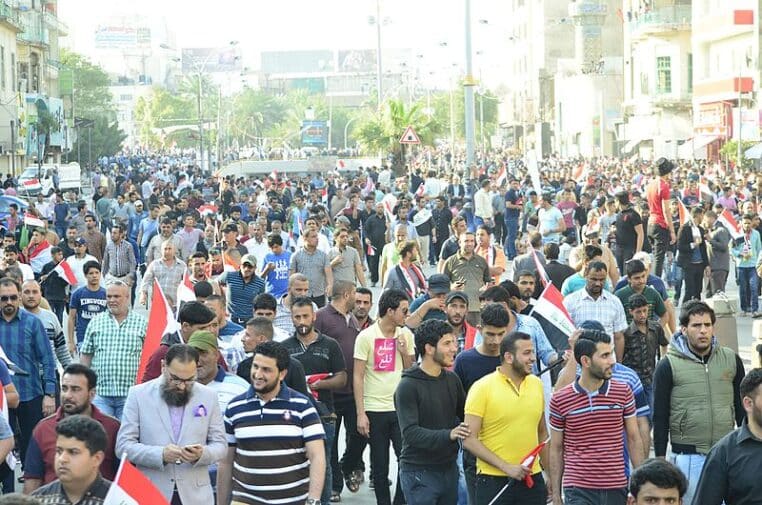

Iraq is once again the scene of massive protests. In the capital and in southern cities thousands-strong demonstrations have been dispersed with tear gas, and police snipers using live ammunition. A huge rally in Sadr City in Baghdad – a district with 3.5 million people, was savagely broken up. UN officials in the city have condemned “a senseless loss of life”. Reuters reports that 110 people have been killed and 6,000 wounded. The government has restricted access to Facebook and WhatsApp in a vain attempt to stop the mobilisations.
The issues which initially triggered the upheaval are mass unemployment and the absence of the most basic public services: this in in the seventeenth year since US and British forces overthrew the regime of Saddam Hussein. Appalling as the dictator’s totalitarian regime was, the “freedom” the Western allies brought with their tanks and “shock and awe bombing” has meant social collapse, endless war and extra-judicial killings.
Events show that the victory over ISIS, loudly trumpeted by the United Sates two years ago, has done little or nothing to improve life for the country’s citizens.
“It has been 16 years of corruption and injustice,” the Guardian reports Abbas Najm, a 43-year-old unemployed engineer, on one demonstration as saying. Demonstrators deny any links to parties or militia groups that they see as part of the country’s many problems. Indeed, in the southern city of Nasiriyah, protesters torched the offices of six political parties that had tried to take advantage of the situation. Reports suggest the intervention by the Shia cleric Muqtada al-Sadr is not welcomed. A demonstrator is quoted as saying; “These men don’t represent us. We don’t want parties anymore. We don’t want anyone to speak in our name.”
Iraq, the fifth largest oil producer in the world, suffers from the rampant corruption of the government and administration while its 40 million people exist in terrible conditions – 22 per cent is absolute poverty and deprivation according to UN figures. 25 per cent of young people are unemployed according to the World Bank.
This, quite as much as the use of live ammunition on crowds, has turned the movement into one demanding the downfall of the government of Prime Minister, Adel Abdul-Mahdi. Iraqi governments since 2003 have been coalitions where rival parties cooperate to loot the states resources. In many respects this movement recalls the early days of the Arab Spring, which Iraq largely “escaped” due to ongoing warfare.
In response, the government has desperately promised two packages of social reforms but once the masses are determined to get rid of the corrupt gang of politicians clerics and generals such feeble remedies are unlikely to quiet things for long.
Events in Iraq, alongside ongoing protests across Egypt against the brutal dictatorship of general Abdel Fattah el-Sisi, show that time and again, the millions of young people in the region, whose Spring was blighted by the chilling frost of counter-revolution in country after country, are driven by deep socio-economic pressures and a yearning for freedom to revolt.
The real question is can they find the strategies and the leadership to make a revolution that puts power into their hands, creates a working class democracy and makes counter-revolution, by the generals, capitalists and imperialism, impossible.